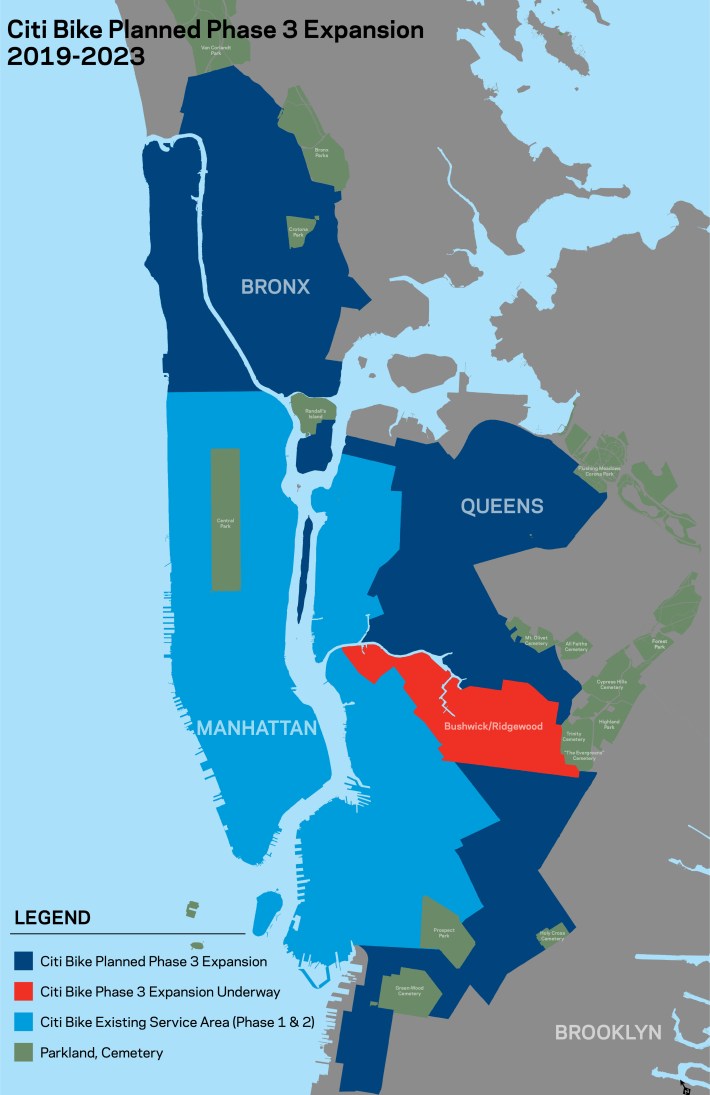City officials and Citi Bike's parent company have not done enough to both encourage cycling in communities of color and improve employment opportunities for their under-served populations, a new report from the influential Bedford Stuyvesant Restoration Corporation suggests.
The 30-page report, issued last week, certainly highlights the positives — such as slowly increasing access to Citi Bike across a more geographically, racially and economically diverse area — but also points to many lingering issues, such as low membership in the Reduced Fare Bike Share program for NYCHA residents as well as larger issues of policing.
"There are systematic issues that need to be addressed, but we can start with major steps like decriminalizing riding on the sidewalk and other cycling infractions and work towards longer-term changes like ending armed police traffic enforcement," said Tracey Capers, executive vice president with the venerable community organization.
For starters, Citi Bike has been slow to expand from its initial core zone in a wealthy and largely White part of Manhattan. The current plan calls for Citi Bike to extend deeper into The Bronx, Brooklyn and Queens by 2024. In addition, a privately funded subsidy to provide $5 monthly memberships for residents of public housing or recipients of food stamps is not reaching nearly as many people as are eligible (roughly 10,000 people are members).
And the Citi Bike zone itself leaves out hundreds of thousands of NYCHA residents.
Studies show that there is still a wide gender and racial gap in cycling in New York City, but the largest problem is that Citi Bike itself does not have enough docks or bikes to satisfy the poorer communities in the city.
That's all part of the Bedford Stuyvesant Restoration Corporation's report, "Cementing an Equity Framework for Micro Mobility," which mostly focuses on how the city should build on its initial and limited successes.
It offers several key recommendations:
- Boost membership numbers in the reduced fare program.
- Grow the program beyond NYCHA residents or food stamp recipients to "under-served communities that are not currently a focus."
- increase job opportunities within the bike share industry.
- increase safety for bike riders.
- "integrate bike share into the workplace as a wellness tool."
Beyond that, the report, which covers the work of the Better Bike Share Partnership between 2017 and 2020, states that members of the BSRC are also advocating for the decriminalization of jaywalking and cycling on sidewalks and parks, which are criminal offense that police enforce in a racially biased manner, as Streetsblog has reported.
The report also reveals that few Blacks and Latinos are benefitting from employment in micro mobility. Citi Bike's leadership and management, like most micro-mobility companies, are largely White and male. According to the report, the partnership will work with government agencies, subcontractors and micro-mobility companies to facilitate and encourage legislation requiring an increase in contracts with cooperatives or minority-owned businesses.
"As the partnership deepened its commitment to equity, the members realized that work needed to be done to elevate people of color into leadership and decision-making positions in the micro mobility industry," the report stated. "The partnership will also work to increase the representation of people of color in the transportation industry in NYC be exploring and creating career pathways."
Keeping cyclists safe means there needs to be proper infrastructure around the city. Wealthier and Whiter neighborhoods have greater access to proper bicycle infrastructure while their counterparts are left waiting for the same safety improvements. Capers believes that for this reason it is important that advocacy comes from these affected communities to support ongoing efforts for safer streets.
"We are a convener and catalyst for conversation," said Capers. "The Better Bike Share Partnership has convened city agencies, community based organizations and residents to push and address these issues as a coalition. Though much of the power to make these changes falls on the city, our elected officials, as well as the private companies operating in our city, we believe that community-based and advocacy organizations are important partners in helping surface solutions and push for change."
A step in the right direction for micro-mobility in diverse neighborhoods underserved by transit is the launch of the city's first e-scooter program in the East Bronx this summer. The Department of Transportation has chosen three companies to supply 1,000 scooters each in Eastchester, Co-op City and Morris Park.
The report states that this development will bring additional transportation options into neighborhoods that have more low-income residents and residents of color. But, the report also states that without an intentional approach grounded in equity, the expansion of micro mobility in the city runs a high risk of perpetuating inequities among racial lines related to access and potential associated economic opportunities.
Lyft highlighted its programs successes in reaching and serving low-income communities, whose members took 10 percent more rides than full-fare members in 2020, the company said. In addition, 42 percent of Citi Bike members are women (a significant narrowing of cycling's gender gap), 52 percent identify as members of "racial and/or ethnic
minority groups," and 40 percent of riders with household incomes under $50,000 use Citi Bike to get to public transit on a weekly basis (compared with 31 percent of members in households with incomes above $50,000).







